Khartoum-Thousands of people have defied a harsh crackdown to take to the streets of Sudan since the military coup on Monday.
Shops are closed and transport is blocked on the streets of Sudan’s capital Khartoum amid a fourth day of protests since Monday’s coup.
General Abdel Fattah al-Burhan – Sudan’s de facto leader since the 2019 removal of longstanding dictator Omar al-Bashir – dissolved the fragile government tasked with overseeing the country’s transition to full civilian rule.
“We’re blocking the roads to ensure our security so that the military forces can’t reach us,” said one young protester putting up barricades in Khartoum. “If they reach us, they will shoot to kill. They killed our brothers over there, next to the military headquarters.
“We’re calling for civil disobedience,” the protester continued. “We don’t want to see anybody at work.”
security forces detained three prominent pro-democracy figures overnight, their relatives and other activists said Wednesday, as internal and international pressure mounted on the military following its coup
UN calls on military to restore civilian-led govt
The UN Security Council called today on the military rulers to restore the civilian-led government that they toppled this week.
The council passed unanimously a statement that expressed “serious concern” about the coup Monday in the poverty-stricken African nation which has enjoyed only rare periods of democracy since gaining independence in 1956.
The council called for the immediate release of all those detained by the military authorities and urged “all stakeholders to engage in dialogue without pre-conditions.”
The British-drafted statement is the product of days of laborious talks among council members and was watered down under pressure from Russia. The council met in an urgent session Tuesday after the putsch.
The statement expresses concern over the “suspension of some transitional institutions, the declaration of a state of emergency” and the detention of Prime Minister Abdalla Hamdok. He was taken Monday by the military and is now under guard at his home, where he was moved after an international outcry. Other ministers remain under full military arrest, however.
One diplomat said that, at the insistence of China, the text notes explicitly that Hamdok did return home on Tuesday evening. But the UN maintains that it considers him as being denied freedom of movement.
The discussions among the Security Council members came against a backdrop of a renewed struggle between Western nations and Russia for influence in Sudan.
A first draft statement floated early this week condemned the coup “in the strongest terms” but this wording was eventually dropped.
In the version that was ultimately adopted, the council “called upon all parties to exercise the utmost restraint, refrain from the use of violence and emphasized the importance of full respect for human rights, including the right to peaceful assembly and freedom of expression.”


